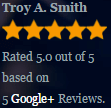Protection against unreasonable search and seizure is a fundamental right granted to every United States citizen by the 4th amendment to Constitution. However, it is surprising how little the general public knows about police searches, and what they should do if they are ever subject to one. Do you know your legal rights in case the police want to search your home or vehicle?
Can the police search your house without a warrant?
Usually, the police need a written search warrant from a judge to enter someone’s home. The officers will need to convince the judge there is a probable cause of some illegal activity going on in the house. There are a few exceptions to this rule.
Plain View
If the police are legally on the property for any reason, and they see something in plain sight, what they see may be used as evidence. An example of this would be responding to a call for a domestic dispute and seeing illegal drugs laying out on a table.
Consent
If the person in charge of the property says yes to a search, then a search without a warrant is legal. Remember that the police do not have to tell you that you have the constitutional right to refuse the search. Once someone gives consent, police may enter the home and search freely without a warrant.
Exigent Circumstances
This exception applies to situations where there is an immediate danger to the public, or if the process of getting a search warrant could lead to loss of evidence. Police searches are also allowed in instances of a chase when there is a chance the suspect might get away.
Search Incident to Arrest
This phrase refers to a situation where a suspect is getting arrested in their house. The police are allowed to do a sweep for weapons for their protection.
It is safest not to interfere with police if they attempt to search your home, even if they are doing it illegally. However, it is important to say out loud, “I do not consent to this search.” Citizens may also ask officers for identification, and ask them why they are there.
Can the police search your vehicle without a warrant?
The rules about police searches at traffic stops differ quite a bit from a property search. For police to legally search your car, they only need probable cause. They need actual evidence that criminal activity is currently taking place to search your vehicle.
What is probable cause in police searches?
Probable cause means merely that the police need to see or hear something real to give them the legal right to search your car. What are some examples of this?
An officer sees drugs or contraband in plain sight in the vehicle.
They smell marijuana.
Police hear someone in the vehicle admit to a crime.
What is not probable cause?
Routine, minor traffic violations like speeding, expired registration, or having a tail light out are NOT probable cause for a police search of your vehicle.
The probable cause loophole in vehicle traffic stops.
If there is no probable cause, police can still search your vehicle if you give them express permission to do so. The officer may ask you if it’s ok to look in your car. If you answer yes in any way, that is giving your permission. It is then legal for the police officer to search your vehicle. Anything illegal they find they can use against you in a court of law.
Follow these rules if you do not want a police officer to search your vehicle.
Stay Calm
It is quite easy to get flustered during a traffic stop, but staying calm and polite is essential. If you get pulled over, turn your car off and place your hands on the wheel while you wait for the police officer. Always address them as “Officer” in a polite manner.
Stay Quiet
You have a 5th amendment right against self-incrimination. You don’t have to answer any leading questions the police may ask you. For example, if asked if you know how fast you were going, you should reply, “No, Officer.”
Say you don’t consent to the search.
You have the right to say no if an officer asks you if you can search your vehicle. An encounter with the police can be confusing and intimidating, but remember your rights and firmly but politely refuse. Moreover, the police do not have to inform you of your right to refuse to have your vehicle searched.
Evidence obtained during an illegal search is not admissible in a court of law. Any evidence obtained in violation of the constitution is inadmissible in a criminal prosecution. If you have questions or more details on what to do in case of police searches, contact an attorney.












